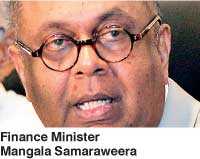Monday Feb 23, 2026
Monday Feb 23, 2026
Monday, 15 October 2018 01:09 - - {{hitsCtrl.values.hits}}
Nusa Dua, Indonesia (asia.nikkei.com): The sharp decline of Sri Lanka’s currency is “not as catastrophic as people make it out to be,” Finance Minister Mangala Samaraweera said in an interview this week, as the country looks to transform itself into an export-powered economy.
The Sri Lankan rupee has fallen by over 10% against the dollar this year, making it one of the worst performing currencies in emerging Asia. 
The country has imposed restrictions on vehicle imports, often the cause of balance of payments trouble for Colombo. Yet, Samaraweera said the currency depreciation - brought on by the Fed’s interest rate hikes and investor concerns about emerging market assets amid the US-China trade war - is a potential positive for his country.
“We have been trying to drive Sri Lanka toward an export-oriented economy,” said the finance minister, who was attending the International Monetary Fund and World Bank annual meetings in Bali. “And this crisis, in a way, makes people realise the need to do so even more vigorously. I don’t consider it a crisis at all.”
Samaraweera said the country’s underlying economic fundamentals are solid, with stable inflation and a primary balance surplus for 2017 - the first in 63 years. “The exports, last year, the numbers were record breaking. The FDIs are flowing in. If you actually look at the numbers, our growth rate ... [for] the last quarter has come up to 3.7%, we are just about to go 4% this year.”
While currency depreciation may be a blessing in disguise for Sri Lanka, Samaraweera, who chairs the G-24 - a group of developing nations from Africa, Asia, and Latin America and the Caribbean - said volatility stirred up by the trade war poses a risk to the emerging world.
For now, he stressed, “there is certainly not yet fear” among G-24 members that recent capital outflows from emerging markets will turn into full-blown capital flight. But he said developing nations need to “face this challenge together.”
“Emerging economies had to face several serious challenges because of the external volatility, and many countries are basically battling it alone,” Samaraweera said. “We feel if the crisis is going to get worse ... then I think we have to have a coalition of the willing, who will work out these strategies to meet these challenges.”
Sri Lanka has been in the news recently because US Vice President Mike Pence cited it as an example of China’s so-called “debt trap” diplomacy. Sri Lanka “took on massive debt to let Chinese state companies build a port with questionable commercial value,” Pence said, pointing to the port of Hambantota. Saddled with debt payments on Chinese loans extended under the Belt and Road Initiative, Colombo leased the port to a Chinese state-owned company for 99 years.
Samaraweera noted that when the current government took power in 2015, it renegotiated clauses in the original infrastructure deals with China that were “inimical to the interests” of Sri Lanka.
“Sri Lanka is more or less in control of all these projects and to now call these a Chinese debt trap is a bit unfair. We are very much on top,” the finance minister said.
“You have the Darwin harbour in Australia, which has been more or less given over to the Chinese. So many harbours and ports in Europe that the Chinese have invested in, but no one is calling them Chinese debt traps. Why is that word only being used on Sri Lanka? That gives a false image of the country.”
(Source: https://asia.nikkei.com/Editor-s-Picks/Interview/Sri-Lankan-currency-fears-are-overblown-finance-minister-argues)